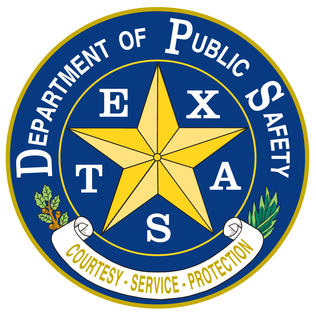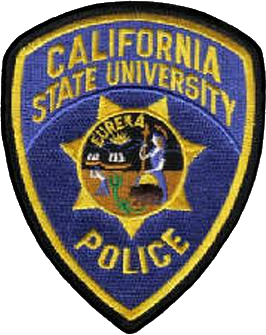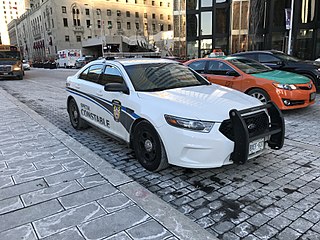Railroad police or railway police are people responsible for the protection of railroad properties, facilities, revenue, equipment, and personnel, as well as carried passengers and cargo. Railroad police may also patrol public rail transit systems.
Security police officers are employed by or for a governmental agency or corporations to provide security services to those properties.
Special police usually describes a police force or unit within a police force whose duties and responsibilities are significantly different from other forces in the same country or from other police in the same force, although there is no consistent international definition. A special constable, in most cases, is not a member of a special police force (SPF); in countries in the Commonwealth of Nations and often elsewhere, a special constable is a voluntary or part-time member of a national or local police force or a person involved in law enforcement who is not a police officer but has some of the powers of a police officer.

The Department of Public Safety of the State of Texas, commonly known as the Texas Department of Public Safety (DPS), is a department of the state government of Texas. The DPS is responsible for statewide law enforcement and driver license administration. The Public Safety Commission oversees the DPS. However, under state law, the Governor of Texas may assume command of the department during a public disaster, riot, insurrection, formation of a dangerous resistance to enforcement of law, or to perform his constitutional duty to enforce law. The commission's five members are appointed by the governor and confirmed by the Texas Senate, to serve without pay for staggered, six-year terms. The commission formulates plans and policies for enforcing criminal, traffic and safety laws, preventing and detecting crime, apprehending law violators, and educating citizens about laws and public safety.

The Federal Protective Service (FPS) is a federal law enforcement agency of the United States Department of Homeland Security (DHS). It is also "the federal agency charged with protecting and delivering integrated law enforcement and security services to facilities owned or leased by the General Services Administration (GSA)"—over 9,000 buildings—and their occupants.

The United States Capitol Police (USCP) is a federal law enforcement agency in the United States with nationwide jurisdiction charged with protecting the United States Congress within the District of Columbia and throughout the United States and its territories. It answers to the Capitol Police Board and is the only full-service federal law enforcement agency appointed by the legislative branch of the federal government of the United States.

The Pennsylvania State Capitol Police is a section of the Pennsylvania Department of General Services providing law enforcement, security and parking enforcement services to the State Capitol Complex in Harrisburg, and at state government office buildings in Philadelphia, Pittsburgh, and Scranton, Pennsylvania. Their jurisdiction is primarily state owned buildings and property on the Capitol Complex. The Capitol Police jurisdiction extends to several state owned buildings throughout the city of Harrisburg and local townships.

The California State University police departments(CSUPD) (known within the California State University system as the Cal State Police or University Police) are the police departments of the California State University system. Their police officers are duly sworn peace officers of the State of California, as established by section 830.2(c) of the California Penal Code. There are a total of 23 campuses in the California State University system, each with their own police department. Each csu' police department has its own chain of command, however some of the policies are system-wide.
The North Carolina State Bureau of Investigation (SBI) is a state-level law enforcement agency in North Carolina.
Private police or special police are law enforcement bodies that are owned and/or controlled by non-governmental entities. Additionally, the term can refer to an off-duty police officer while working for a private entity, providing security, or otherwise law enforcement-related services. These officers do have power to uphold the laws under the discretion of the private company.

Airport police units are a security police agency assigned to perform law enforcement functions at airports. They provide a wide range of law enforcement duties and responsibilities including patrol, investigation, traffic flow management, and control and response to airport emergencies. Airport police provide enhanced safety to airport employees, and to passengers. Officers can be found at security gates, throughout the terminal area, and around the airport’s perimeter.

In the United States, a sheriff is the chief of law enforcement of a county. Sheriffs are usually either elected by the populace or appointed by an elected body.

The Florida Department of Law Enforcement (FDLE) is a state-wide investigative law enforcement agency within the state of Florida. The department formally coordinates eight boards, councils, and commissions. FDLE's duties, responsibilities, and procedures are mandated through Chapter 943, Florida Statutes, and Chapter 11, Florida Administrative Code. FDLE is headed by a commissioner who reports to the Florida Cabinet, which is composed of the governor, the attorney general, the chief financial officer, and the commissioner of agriculture. The commissioner is appointed to his position by the governor and cabinet and confirmed by the Florida Senate.

In the United States, the state police is a police body unique to each U.S. state, having statewide authority to conduct law enforcement activities and criminal investigations. In general, state police officers or highway patrol officers, known as state troopers, perform functions that do not fall within the jurisdiction of the county sheriff, such as enforcing traffic laws on state highways and interstate expressways, overseeing the security of the state capitol complex, protecting the governor, training new officers for local police forces too small to operate an academy and providing technological and scientific services. They support local police and help to coordinate multi-jurisdictional task force activity in serious or complicated cases in those states that grant full police powers statewide.

The Baltimore City Sheriff's Office is the law enforcement arm of the Circuit Court of Maryland, serving Baltimore City, Maryland. The office is headquartered in the Baltimore City Circuit Courthouses which also serves as the sites for Baltimore City branch of the Circuit Court of Maryland.

A special constable or special police constable can refer to an auxiliary or part-time law enforcement officer or a person who is granted certain (special) police powers.

The North Carolina General Assembly Police is a force responsible for policing the North Carolina General Assembly buildings in Wake County, North Carolina, United States. The force is separate from the North Carolina State Capitol Police
The North Carolina Department of Revenue was created in 1921 by the North Carolina General Assembly. The department is headed by a Secretary that is appointed by the Governor. The secretary is a member of the North Carolina Cabinet. Currently, the department is responsible for administering the collection of the North Carolina state income tax, gasoline tax, sales tax, beverage tax, and inheritance tax.

The Maine Capitol Police is the capitol police agency of the state of Maine responsible for policing the Maine State House, the state capitol, and other state agency buildings, grounds and properties in the state. Capitol Police officers are located at the Capitol Complex, but have statewide jurisdiction where required.












